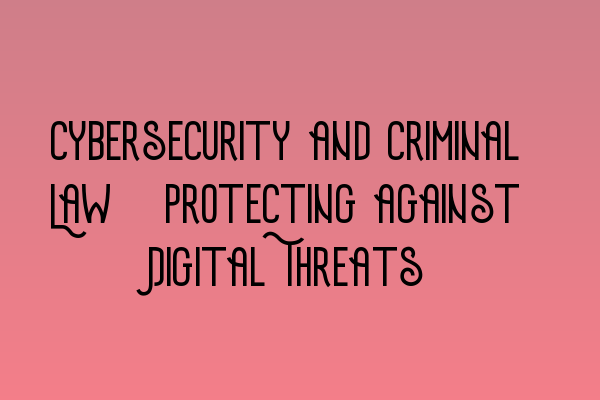Cybersecurity and Criminal Law: Protecting against Digital Threats
In today’s digital age, where technology and the internet play a central role in our daily lives, it is crucial to understand the intersection between cybersecurity and criminal law. With the rapid advancement of technology, criminals have also adapted, finding new ways to exploit vulnerabilities and commit crimes in the digital realm. As a result, it is essential for individuals, businesses, and governments to stay informed and take proactive steps to protect against digital threats.
The Rise of Cybercrime
Cybercrime has become a significant concern worldwide, with individuals and organizations falling victim to hacking, identity theft, fraud, and other malicious activities. These crimes not only pose a monetary risk but also threaten the privacy and security of individuals and institutions. As the number of connected devices and users continues to grow, the potential for cyber-attacks increases exponentially.
Expert testimonies play a crucial role in building strong cases in UK courts when it comes to cybercrime. With their specialized knowledge and skills, experts can provide valuable insights into the nature of the crime, the methods used, and the potential impact on the victims. Their testimony can help in establishing a strong legal framework for prosecuting cybercriminals.
The Intersection of Cybersecurity and Criminal Law
Criminal law must continually evolve to keep up with the changing landscape of technology and the digital world. Legislations and regulations are being enacted to address cybercrime and protect against digital threats. Lawyers specializing in cybercrime are at the forefront of these efforts, ensuring that individuals and organizations are equipped with the legal tools to fight against cybercriminals.
Demystifying the Solicitors Qualifying Examination (SQE) Format is essential for aspiring solicitors aiming to specialize in criminal law. The SQE exam thoroughly assesses candidates’ knowledge and understanding of cybersecurity and its legal implications. By passing the SQE exam, solicitors demonstrate their expertise and competency in handling cybercrime cases.
Roles and Responsibilities in Cybersecurity
Protecting against digital threats requires a collective effort from individuals, businesses, and governments. Each entity has a role and responsibility to play in ensuring cybersecurity:
- Individuals: It is crucial for individuals to stay informed about the latest cybersecurity best practices. This includes using strong and unique passwords, enabling two-factor authentication, and being cautious of suspicious emails or links.
- Businesses: Organizations have a duty to protect their customers’ data and sensitive information. Implementing robust cybersecurity measures, conducting regular security audits, and educating employees about potential online threats are essential steps for businesses to take.
- Governments: Governments play a pivotal role in establishing legislation and regulations to combat cybercrime. They also have a responsibility to collaborate with international partners to tackle cyber threats, share information, and enforce cyber laws.
SQE exam prep is an excellent way for aspiring solicitors to gain the knowledge and skills necessary to advise individuals, businesses, and governments on cybersecurity matters. Understanding the legal framework surrounding cybercrime is essential in providing effective legal representation and support.
The Importance of Cybersecurity in Protecting Against Digital Threats
With the increasing reliance on technology and interconnected systems, cybersecurity is paramount in protecting against digital threats. Here are three key reasons why cybersecurity is of utmost importance:
- Data Protection: Cybersecurity measures are essential in safeguarding personal, financial, and sensitive data. Encryption, firewalls, and intrusion detection systems help prevent unauthorized access and data breaches.
- Preventing Financial Loss: Cybercriminals are motivated by financial gain. By implementing robust cybersecurity measures, individuals and businesses can mitigate the risk of financial loss resulting from fraud, ransomware attacks, and other cyber-attacks.
- Preserving Privacy: Protecting privacy in the digital world is crucial. Cybersecurity measures ensure that individuals’ personal information remains confidential and is not misused or exploited.
For UK entrepreneurs, understanding the legal requirements for establishing a secure business is vital. LLC formation offers a step-by-step guide for UK entrepreneurs to navigate the legal landscape and establish businesses with robust cybersecurity measures in place.
Conclusion
In conclusion, the rapid advancement of technology has given rise to new challenges in the form of cybercrime. To protect against digital threats, individuals, businesses, and governments must prioritize cybersecurity and incorporate legal measures to combat cyber-attacks. By understanding the intersection between cybersecurity and criminal law, professionals in the legal field can play a crucial role in safeguarding individuals, businesses, and society as a whole from digital threats.
